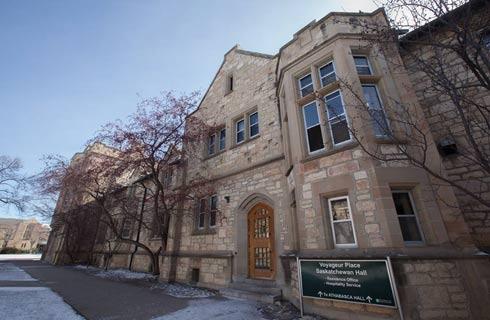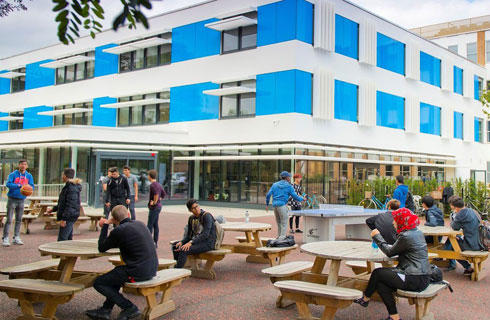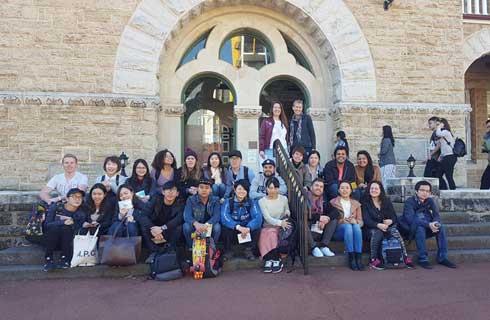Bachelor of Science in Neuroscience

学历文凭
Bachelor Degree

专业院系
Department of Molecular, Cell and Systems Biology

开学时间

课程时长

课程学费

国际学生入学条件
Record all courses and marks/grades earned exactly as reported by the international school whether as numbers, letters, percentages or words.
To meet minimum requirements to be considered for UCR selection, you must earn a minimum GPA of 3.4 on a 4.0 scale (equivalent to an 85 percent on a 100 percent scale).
You can demonstrate proficiency by meeting any of the following exam benchmarks Keep in mind that you must complete one of these exams by December of your final year of high school secondary school.
Score 24 or higher for the ACT English Language Arts ELA
Score 31 or higher on Writing and Language in the SAT
Score 3, 4 or 5 on the AP examination in English Language and Composition or English Literature and Composition
Score 6 or 7 on the IB Standard Level examination in English Language A only
Score 5, 6 or 7 on the IB Higher Level examination in English Language A only
Score 6.5 or higher on the International English Language Testing System IELTS, Test of English as a Foreign Language TOEFL examination Internet based test IBT Minimum score of 80 or better, Paper delivered test Minimum score of 60 or better, Duolingo English Test DET Minimum score of 115.
IDP—雅思考试联合主办方

雅思考试总分
6.5
- 雅思总分:6.5
- 托福网考总分:80
- 托福笔试总分:160
- 其他语言考试:Duolingo English Test (DET): Minimum score of 115
CRICOS代码:
申请截止日期: 请与IDP联系 以获取详细信息。
课程简介
相关申请
 预科
预科 奖学金
奖学金 实习机会
实习机会 在校学习
在校学习 跨境学习
跨境学习 校园授课-线上开始
校园授课-线上开始 在线/远程学习
在线/远程学习
开学时间&学费
学费信息仅供参考,请与IDP联系以获取详细信息
| 开学时间 | 时长 | 学费 | 地点 |
|---|
学校排名

世界排名201
数据源:
泰晤士高等教育世界大学排名
关于加州大学河滨分校

在美国西部洛杉矶和圣地亚哥之间拥有美丽校园的加州大学河滨分校(简称UCR),名列世界大学前200。作为加州大学系统成员之一的UCR是一所值得就读的知名学府。不仅提供一支由世界一流学者组成的专业团队,还提供蔚为壮观的设施和资源,供学生在走入职场前培养自我职业技能。例如,UCR图书馆拥有300万册图书,以及250多万册其他资料,包括为学生提供的各种视听辅助资料。UCR以其进行开创性研究的能力而倍感自豪,名列《华盛顿月刊》美国公立研究型大学前15。大学仅在2016年便已获得1.4亿美元的研究经费。 非常重视包容性的UCR是为未被充分代表群体提供优质教育的先驱。不得不说的是,UCR因其为学生提供的助学贷款而被《学生贷款报告》评为美国最慷慨的公立大学。凭借其促进学生健康生活方式的坚定信念,UCR提供广泛的课外活动供学生参与以保持其最佳身心健康。学生娱乐中心是一个极富魅力的健身设施,拥有一个巨大的游泳池、一个32英尺的攀岩墙、大量校内体育活动及一个配有有氧运动器械和举重房的21000平方英尺健身房。大学还具有浓烈的艺术与文化氛围,拥有450多个可参与的学生组织,并拥有由300多名学生运动员组成的 ''高地人'',属于最高等级的美国大学体育运动中的全国大学体育协会第一级别。
本校相关课程

法律与社会文学学士
学历文凭
Bachelor Degree
开学日期
课程费用总额


通识教育文学士
学历文凭
Bachelor Degree
开学日期
课程费用总额


Bachelor of Arts in Global Studies
学历文凭
Bachelor Degree
开学日期
课程费用总额


亚洲研究文学学士学位
学历文凭
Bachelor Degree
开学日期
课程费用总额


Bachelor of Science in Plant Biology
学历文凭
Bachelor Degree
开学日期
课程费用总额


Bachelor of Arts in Plant Biology
学历文凭
Bachelor Degree
开学日期
课程费用总额

其他相关课程

Master of Science in Neuroscience
 匹兹堡大学
匹兹堡大学学历文凭
Masters Degree
开学日期
课程费用总额


心理学文学硕士-认知和行为神经科学。
 乔治梅森大学
乔治梅森大学泰晤士高等教育世界大学排名:426
学历文凭
Masters Degree
开学日期
课程费用总额


神经诊断技术艺术副学士
 贝尔维尤学院
贝尔维尤学院学历文凭
Associate Degree
开学日期
课程费用总额


神经科学理学学士-Neuromotor(Honours)Co-Op
 布鲁克大学
布鲁克大学学历文凭
Bachelor Degree with Honours
开学日期
课程费用总额


Doctor of Philosophy in Neuroscience
 加州大学洛杉矶分校
加州大学洛杉矶分校泰晤士高等教育世界大学排名:19
学历文凭
Ph.D.
开学日期
课程费用总额


Bachelor of Arts in Neuroscience and Behavior (Premed)
 圣母大学
圣母大学泰晤士高等教育世界大学排名:194
学历文凭
Bachelor Degree
开学日期
课程费用总额










